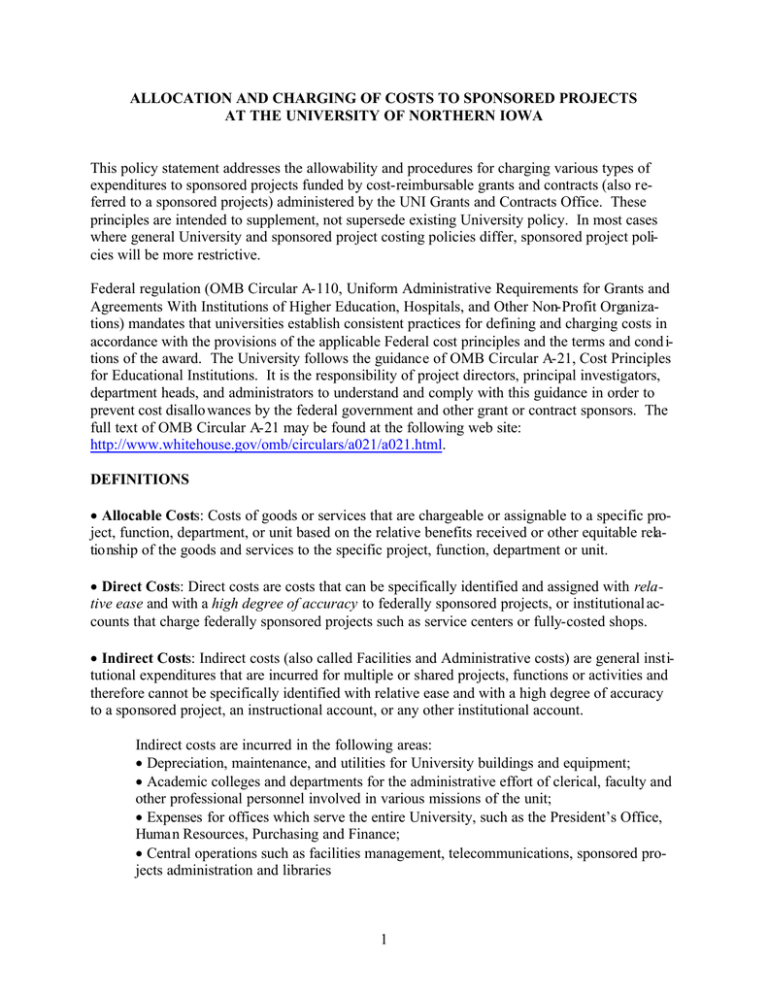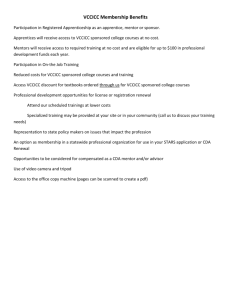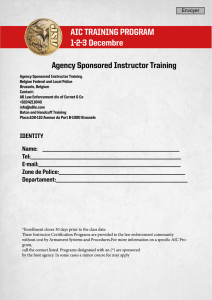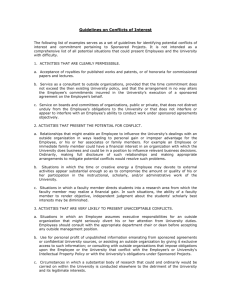This policy statement addresses the allowability and procedures for charging... expenditures to sponsored projects funded by cost-reimbursable grants and contracts... ALLOCATION AND CHARGING OF COSTS TO SPONSORED PROJECTS
advertisement

ALLOCATION AND CHARGING OF COSTS TO SPONSORED PROJECTS AT THE UNIVERSITY OF NORTHERN IOWA This policy statement addresses the allowability and procedures for charging various types of expenditures to sponsored projects funded by cost-reimbursable grants and contracts (also referred to a sponsored projects) administered by the UNI Grants and Contracts Office. These principles are intended to supplement, not supersede existing University policy. In most cases where general University and sponsored project costing policies differ, sponsored project policies will be more restrictive. Federal regulation (OMB Circular A-110, Uniform Administrative Requirements for Grants and Agreements With Institutions of Higher Education, Hospitals, and Other Non-Profit Organizations) mandates that universities establish consistent practices for defining and charging costs in accordance with the provisions of the applicable Federal cost principles and the terms and cond itions of the award. The University follows the guidance of OMB Circular A-21, Cost Principles for Educational Institutions. It is the responsibility of project directors, principal investigators, department heads, and administrators to understand and comply with this guidance in order to prevent cost disallo wances by the federal government and other grant or contract sponsors. The full text of OMB Circular A-21 may be found at the following web site: http://www.whitehouse.gov/omb/circulars/a021/a021.html. DEFINITIONS • Allocable Costs: Costs of goods or services that are chargeable or assignable to a specific project, function, department, or unit based on the relative benefits received or other equitable relationship of the goods and services to the specific project, function, department or unit. • Direct Costs: Direct costs are costs that can be specifically identified and assigned with relative ease and with a high degree of accuracy to federally sponsored projects, or institutional accounts that charge federally sponsored projects such as service centers or fully-costed shops. • Indirect Costs: Indirect costs (also called Facilities and Administrative costs) are general institutional expenditures that are incurred for multiple or shared projects, functions or activities and therefore cannot be specifically identified with relative ease and with a high degree of accuracy to a sponsored project, an instructional account, or any other institutional account. Indirect costs are incurred in the following areas: • Depreciation, maintenance, and utilities for University buildings and equipment; • Academic colleges and departments for the administrative effort of clerical, faculty and other professional personnel involved in various missions of the unit; • Expenses for offices which serve the entire University, such as the President’s Office, Human Resources, Purchasing and Finance; • Central operations such as facilities management, telecommunications, sponsored projects administration and libraries 1 • Indirect Cost Rate: A composite rate applied to sponsored projects as a percentage of the sponsored project’s direct costs. The federally negotiated indirect cost rates for organized research are developed by the University in accordance with OMB Circular A-21 and nego tiated with the Department of Health and Human Services, the University’s federal cognizant audit agency. • Service Centers and Department Recharge Accounts: A University of Northern Iowa unit that sells goods and services predominately to colleges or departments within the institution. Service centers and department recharge accounts must be based on actual use of their services and utilize a rate schedule that does not discriminate between federally and non- federally supported activities of the university. • Sponsored Projects: Projects funded by federal and nonfederal agencies that are administered by the Office of Grants and Contracts. Sponsored projects include grants, contracts and cooperative agreements for research, training and public service activities. Sponsored projects are assigned to Oracle account fund segment series 400 - 699. CHARGING DIRECT COSTS The major criterion for direct charging of costs to sponsored agreements is the identification of a given cost with the sponsored work rather than the nature of the goods and services involved. In order for expend itures to be considered as direct costs, they must be: • Reasonable and necessary for the performance of the project; • Allowable – Costs that are specifically allowed under the terms and conditions of federally sponsored projects and OMB Circular A-21. Agencies that sponsor grants and contracts use the term allowable to mean permitted as a direct cost under the terms of a specific grant or contract. Expenses that are generally allowable for federal reimbursement may not necessarily be permitted under the terms of a specific grant or contract; • Allocable and easily identifiable – The costs must have a direct benefit and be directly attributable to the project or activity being performed. Costs incurred for multiple projects/activities must be identified as follows: • If the cost is specific and benefits more than one project, the cost can only be assigned and allocated to the project(s) based on that portion of the expense that represents the direct benefit to the project. If an appropriate basis such as actual usage cannot be identified to allocate the costs with relative ease and with a high degree of accuracy, such costs must be considered indirect costs. As a rule of thumb, if these costs benefit multiple (e.g., four or five) projects/activities, the ability to accurately allocate the cost to the appropriate projects/activities diminishes and therefore becomes questionable as a direct cost. 2 • If the benefit is spread over multiple projects to serve common shared activities and it is difficult to identify a direct benefit to each activity or project, the cost must be considered an indirect cost. Unacceptable Direct Cost Charging Practices The following examples are unacceptable practices of direct charging: • Rotating charges among projects without establishing that the charges accurately reflect the relative benefit to each project during that specified period of time; • Allocating costs normally treated as indirect expenses directly to a project; • Transferring expenses from other accounts at the end of a project period for the sole purpose of expending a residual balance. Expense Allocation Policies and Procedures In some situations, it may be difficult or unreasonable to determine at the time of purchase or vendor payment how much an allowable but shared direct cost expenditure bene fits a particular sponsored project. The basis of an allocation or distribution (effort, square footage, headcount, or other measure of usage) must logically relate to the type of cost being allocated. The allocation methodology must produce a result tha t is allowable, allocable, and reasonable. Examples of such types of allocated costs include, but are not limited to: lease payments on buildings, vehicles, and other equipment; payments to providers of services utilized on multiple projects (insurance, internet services, etc.), and personnel salaries shared among multiple projects contributing varying periodic effort. An expense allocation clearing or distribution account is a method that enables apportionment of a particular expense or expenses to accounts that specifically benefit from those charges. Sponsored project accounts may not be used as distribution accounts. The Grants and Contracts Office may set up a special account for this purpose if a department has no other account eligible to receive unallocated shared expenditures. Transfer of allocated expenditures from a clearing account to one or more sponsored project accounts must be made no less frequently than monthly via a MEMFIS Journal Entry form. The form may be downloaded from the UNI Forms Repository at http://access.uni.edu/forms/index.shtml . The Grants and Contracts Office (phone 36437) should be contacted for guidance on how to complete and submit the form. All Journal Entry forms initiated by departments (except those prepared by approved university charge back centers) that allocate costs to or from sponsored project accounts must be preaudited by the Grants and Contracts Office prior to submission to the Controller’s Office for posting to the university’s accounting system. 3




